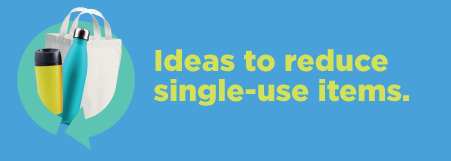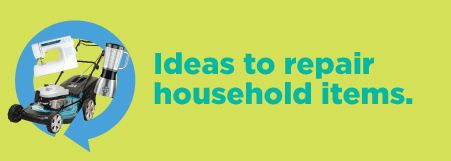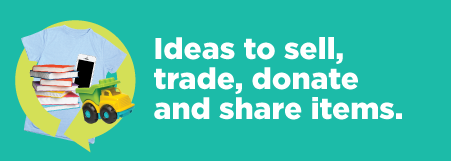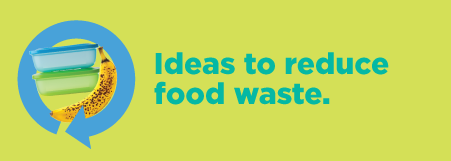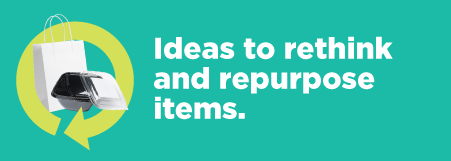Let's Rethink Waste
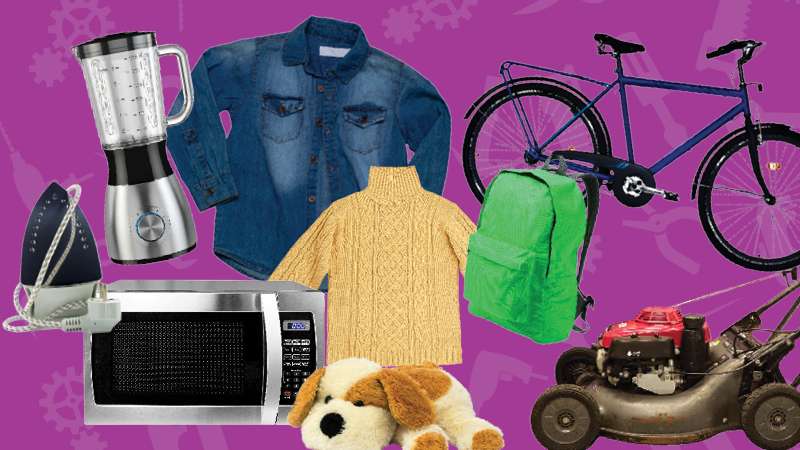
Reuse & Repair Café
Richmond is encouraging residents to “Rethink Waste” to help reduce waste and support a circular economy, including extending the life of items by repairing.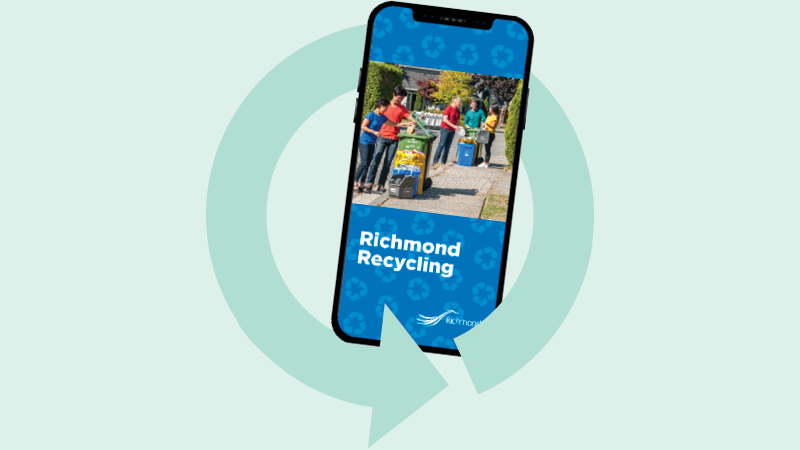
Paper Calendar Opt-Out
Opt out of receiving future paper copies of your collection calendar in the mail.
Bike Reuse & Repair
Explore Richmond repair and reuse options before recycling your bicycle.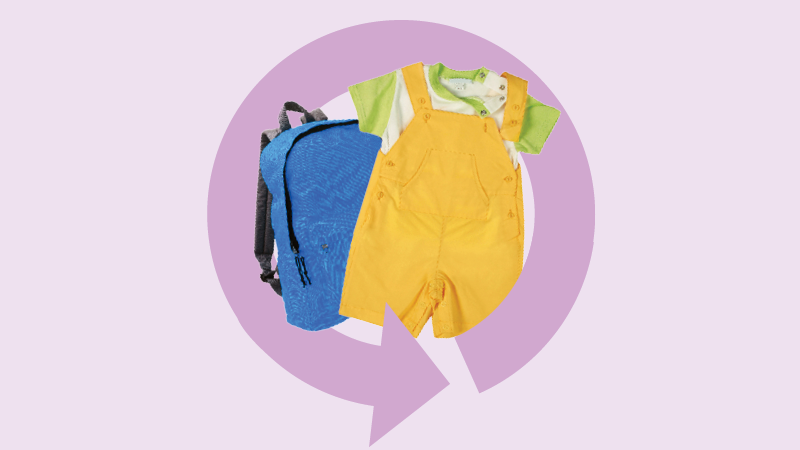
Clothing Reuse & Repair
Check out options for donation to keep clothes in circulation and out of the landfill.
Community Ideas Hub
Tips, resources and other suggestions shared by community members as part of the Rethink Waste Think Tank to help reduce household waste.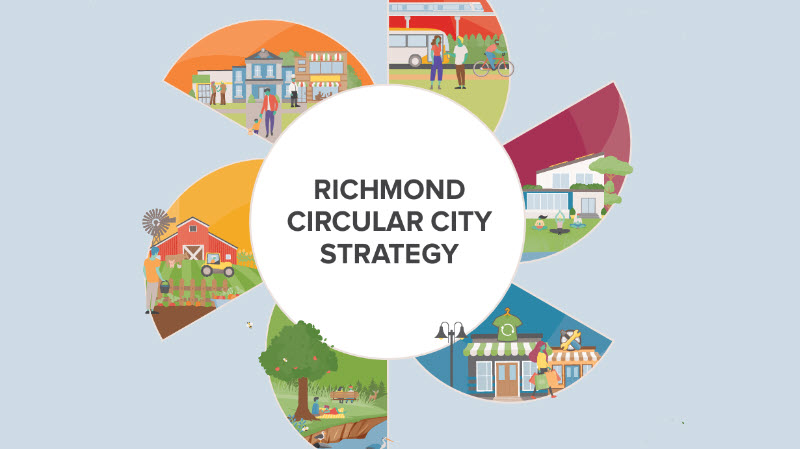
Circular City Strategy
A new strategy has been developed to guide the City of Richmond in achieving a 100% circular economy by 2050.Bicycle Reuse & Repair
Bike Repair
The following list has been compiled for information purposes only. Please note the list is not exclusive, nor is the City responsible for any aspect of the products or services offered.
If you provide bike repair or accept bicycle or bicycle repair accessories and would like to have your business added to this list, please contact garbageandrecycling@richmond.ca.
| Bicycle Repair | Contact Information |
|---|---|
| Krusty's Bicycles | 135-8460 Alexandra Rd, Richmond, BC 604-270-2020 |
| Village Bikes | 3891 Moncton St, Richmond, BC 604-274-3865 |
| BCAA | Roadside assistance for BCAA members 604-268-5850 |
| Velofix | Mobile service +1 855-835-6349 |
Bike Reuse
| Bicycle Donation for Reuse | Contact Information |
|---|---|
| Richmond Hospital Thrift Shop | 3731 Chatham St, Richmond, BC 604-271-1551 |
| Value Village | 8240 Granville Avenue, Richmond, BC 604-248-2285 |
| BC SPCA Thrift Store | 160-5400 Minoru Boulevard, Richmond, BC 604-276-2477 |
| Regional Animal Protection Society (RAPS) Cat Sanctuary Thrift Store | 8260 Granville Ave Richmond, BC 604-244-7529 |
| RAPS Animal Hospital Thrift Store | 9040 Francis Rd, Richmond BC 604-242-1825 |
| Richmond Family Place Thrift Store | 8660 Ash Street, Richmond, BC 604-278-4336 (please call ahead before donating) |
| SOS Children’s Village Thrift Store | 3800 Moncton Street, Richmond, BC 604-274-8866 |
| Big Brothers Big Sisters of Vancouver | Check if this organization can pick-up from your home 604-526-2447 |
Clothing Reuse & Repair
Repair Videos
| Stitching a hole | |
| Sewing a button on pants | |
| Repairing a torn seam | |
| Sewing a button on a shirt |
Clothing Care Tips
Before you wash
- Sort your clothes by colour (light and dark) and fabric (heavy and delicate).
- Empty pockets, zip zippers, and close bra hooks to avoid them snagging on other clothes.
- Turn clothes inside out to avoid fading.
- Always read the label carefully before washing new clothes and follow the care instructions.
Keep it calm and cool
- Wash your clothes on the coldest and gentlest cycle you can — double check the label if you're unsure.
- Most detergents work well in cold water, and as a general rule, the less detergent you use the better it will be for the longevity of your clothes.
- Washing in cold also reduces the number of microfibres that are shed from our laundry and can improve the health of our oceans.
- Learn more about microfibres and their impact on ocean health from Metro Vancouver.
Drying
- Hanging clothes to dry is a great way to preserve their quality and extend their lifespan.
- Knit sweaters should be laid flat to dry to preserve their shape.
- If using the dryer, choose a lower temperature and gentler cycle to make your clothes last longer.
Ironing
- Use the lower settings as these will be much kinder to your clothes.
- Hang up your clothes immediately after drying to prevent wrinkles and reduce how much they need to be ironed.
- Try hanging a few shirts or pants in the bathroom while you shower. The steam will relax wrinkles and reduce ironing need.
- Always read the label carefully before washing new clothes and follow the care instructions.
Fabric Care
Dealing with pilling
- Use a fabric shaver or sweater comb to gently removing pilling.
- Wash clothes inside out to reduce friction.
- Avoid overloading the washing machine.
Preventing fabric wear
- Store delicate fabrics folded instead of hanging, to prevent stretching.
- Use a gentle determent and avoid too much fabric softener, which can break down fibres.
- Rotate frequently worn items to give fabrics time to recover.
Shopping Tips to Reduce Clothing Waste
- Identify gaps in your wardrobe.
- Walk in with a plan, and avoid impulse items.
- Review your closet, keep in mind what new items might go well with what you already have at home.
- Study the items in your wardrobe that have held up longer than others. Shop for quality items.
Tips for identifying quality
- Quality clothing should feel smooth and substantial. The stronger and more substantial the fiber, the more likely it will last longer.
- Hold the garment up to the light to get a better look at it. The more tightly packed or spun the weave, the better.
- Inspect the seams, inside and out. Look for stitching that is even and closely spaced. Avoid sloppy or loose stitching or button holes with fraying ends.
- Look for collars on dress shirts and waistbands on pants with interfacing (thicker cloth that creates structure to keep the garment shape stable).
- Natural fibers, such as cotton, wool, linen, or silk are typically a good sign of better quality. Cheaper synthetic materials such as polyester, acrylic, spandex, rayon and other manmade fibers are usually an indicator of a lower quality item.
- Natural fibers can withstand repeated washing and drying, whereas synthetic materials will break down much quicker.
Tips for shopping second-hand
- Shop with purpose. If you're a first time second-hand shopper, start with a specific outfit in mind and shop with your wardrobe in mind.
- Think about things that you already own that might match with your new purchases.
- Second-hand consignment stores, vintage clothing shops, garage sales, online communities, and clothing swaps are all great places to find quality second-hand clothes.
- Always try it on. Clothes can look quite different once you pull them off the hanger and try them on. Sizes vary between eras and manufacturers, so make sure it fits before you take it home.
- Remember to inspect the garment for quality too — the same rules apply for second-hand clothing.
- Before you head out to the thrift shop, check around your home for items to donate/
Clothing Donation for Reuse
Donation and recycling can help keep clothing and textiles out of the garbage.
20-25% of donated clothing is resold or reused locally as the volume of donations is higher than the demand. The remaining clothes are sold to used clothing brokers, who sort and sell clothing to markets where they can be sold, and some is ultimately disposed in the garbage.
Learn more about what happens to donated clothes from Metro Vancouver.
| Clothing Donation for Reuse | Contact Information |
|---|---|
| Value Village | 8240 Granville Avenue, Richmond, BC 604-248-2285 |
| BC SPCA Thrift Store | 160-5400 Minoru Boulevard, Richmond, BC 604-276-2477 |
| Regional Animal Protection Society (RAPS) Cat Sanctuary Thrift Store | 8260 Granville Ave Richmond, BC 604-244-7529 |
| RAPS Animal Hospital Thrift Store | 9040 Francis Rd, Richmond BC 604-242-1825 |
| Richmond Family Place Thrift Store | 8660 Ash Street, Richmond, BC 604-278-4336 (please call ahead before donating) |
| SOS Children’s Village Thrift Store | 3800 Moncton Street, Richmond, BC 604-274-8866 |
| Big Brothers Clothing & Books Donation Bin |
|
| RFCS Clothing Donation Bin |
|
| Diabetes Canada Clothing Donation Bin | Gateway Theatre North Parking Lot (6500 Gilbert Rd) |
The above list has been compiled for information purposes only. Please note the list is not exclusive, nor is the City responsible for any aspect of the products or services offered. If you accept clothing donations and would like to be added to this list, please contact garbageandrecycling@richmond.ca.
Community Ideas Hub

This Ideas Hub features tips, resources and other suggestions shared by community members as part of the Rethink Waste Think Tank to help all of us reduce household waste.
Changing our habits to think differently about purchases, avoid unnecessary waste and find ways to reuse and recycle products contributes directly to positive outcomes like reducing reliance on raw materials. Ultimately, it's about shifting to a circular economy, where the materials we use stay in circulation to be used, reused or repaired, and recycled multiple times into new products.
- Choose reusable options like reusable straws, containers and bags such as checkout bags, sandwich bags, gift bags and produce bags.
- Keep reusable items like bags in the car so they are handy when needed.
- Use reusable masks instead of disposable types.
- Choose reusable natural substitutes for plastic wrap such as beeswax coated cloth wraps and reusable silicon stretch wraps.
- Instead of using plastic wrap, use a plate to cover food.
- For more tips and information about reducing single-use items, see the Single-Use Plastic Ban.
- Use refillable containers for shampoo, conditioner, body wash, etc. and purchase bulk-sized products to fill them.
- When you get takeout food, opt out of cutlery and use your own instead.
- Before tossing out an item, first consider whether it can be repaired.
- Participate in a Richmond Repair Fair.
- Visit think-thrice.ca to learn more about Metro Vancouver's campaign on how to reduce, reuse and repair your clothing items.
- Refurbish your barbecue: First, keep your barbecue clean with regular brushing of the grates plus washing the exterior. Second all parts are replaceable such as the ignitor to the burners and all the heat plate, hoses etc. Bottom line is you save money and reduce waste going to the landfill.
- Check out iFixit repair guides for instructions on how to repair a variety of household items including mobile phones, game consoles, appliances and other items.
- Learn about how we can support the circular economy by repairing items through the Ellen MacArthur Foundation Empowering Repair partnership.
- Donate clean and gently used clothing items and accessories.
- There are many Facebook pages that allow us to share and give away useable, good items that we no longer use including local Buy Nothing Groups
- Do not throw them away. Call local charities and find out what they will accept.
- Create neighbourhood sharing libraries for books, tools, toys etc.
- Contact elementary and high schools to offer cardboard boxes for project supplies.
- Buy and sell goods and clothing second-hand through Poshmark, VarageSale, Craigslist, Facebook Marketplace.
- Make a grocery list before shopping based on a planned meals, and use a "first-in, first-out" way to organize food.
- Label the purchase date on food.
- Store fruit and vegetables properly so they last longer.
- Get creative with leftover so they are actually eaten. Inform yourself on "best before" and "expiry" dates.
- Buy meat in bulk, carve it yourself, then save the bones and other unwanted parts to make broth.
- Cook more often – supporting restaurants is great but takeout generates a lot of waste.
- Don’t toss out any leftovers – freeze them and use them in a fried rice or other dish.
- Store vegetables in containers in the fridge to extend to keep them fresh longer, such as perforated produce bags.
- Use vegetable scraps to add flavour to soups/broths.
- Freeze vegetables that are not used to use in soups/broths.
- Eat your kids’ leftovers.Decrease the quantity of food purchased so less waste.
- For more tips and tricks visit Love Food Hate Waste Canada.
- Before buying something, ask yourself:
- Will I use it in a year?
- Do I already have something similar to it at home?
- Can I buy it second hand? Do I really need this?
- Will it create unnecessary waste?
- When you are buying something, consider:
- Can each component be taken apart and repaired if needed?
- Can the item be recycled whole?
- If not, can each component be taken apart and recycled?
- Is this product made to last?
- Are there alternatives with longer useful lifespan?
- Are the products made with recycled content and minimal packaging?
- Can you buy it in bulk or make it yourself – such as using a yogurt machine rather than buying individual yogurt packages.
- Are there refurbished options?
- Can you get a digital receipt instead of printed receipt?
- For tips on what to look for when you shop for new clothes, visit Metro Vancouver Think Thrice about Your Clothes.
- You can repurpose diaper tabs. Yes, it's a tiny thing, but... they stick to felt boards, so instead of buying the stickers for story felt boards, use these tabs to instead.
- Use discount fabrics to sew bags and wraps for all gift giving - they can be reused forever.
- Save takeout containers and re-use them to pack lunches or store food.
- Make reusable cloth snack bags. These make great party favours for little kids.
- Hoses often get holes in them or the ends get damaged. Instead of garbage, they are perfect for use in setting up drip irrigation systems.
- Use old textiles to make dog blankets, reusable cloth paper towels, acoustic wall panels, etc.
- Use plastic containers as plant pots to give away as gifts.
- Divide your plants as they grow and give them away in a recycled container.
- Cut up clean t-shirts that can't be used anymore. Use them instead of cotton pads.
- Wash in laundry mesh bag to avoid loss in the machine.
- Reuse bags from stores as gift bags.
- Decorate with old cards to hide the store name. You get to be creative and reuse materials at the same time.
- Encourage your school metalworking, wood-working and textile classes to use and improve old furniture and textiles in their projects.
- Use the unwritten side of Christmas/birthday cards for good quality scrap paper.
- Before recycling an item, ask yourself if it can be repurposed.
- Use bread tags as decorations on homemade cards.
- Recycle packaging material as gift wrap. Add some paint and ribbon to jazz it up.
- Produce ties can be used to tie together cables/keep them organized.
- Cut tubes from toothpaste, lotion, etc. in half and scrape out what's inside as needed, getting up to 10 days more use.
- Host virtual parties to save on gas and materials.
- Carpool or take public transportation to holiday events.
- Make your dinner party a container party, ask guests to bring reusable containers to take home leftovers so nothing goes to waste.
- Volunteer your time together.
- Donate to a person’s favourite charities as a gift.
- Learn a new skill or share your talents and give a lesson as a gift.
- Reduce wrapping by giving gifts like subscriptions, memberships, online gifts and gift cards.
- Suggest a ‘no gift’ Christmas and choose experiences to do together as families and friends.
- Try ‘White Elephant’ or ‘Santa Sack’ this Christmas, to give a single gift rather than multiple gifts.
- Thrift your gift or Shop thrift stores, online marketplaces and sites like “Buy Nothing” to give second hand items as gifts.
- Shop local and support local artisans.
- Bring your own cloth bag when shopping for food or presents.
- Gift or re-gift your possessions that you feel someone else may enjoy, find useful or meaningful.
- Give ingredients for soup, cookies or potpourri as gifts.
- Turn wrapping paper and gift scraps into unique Christmas cards.
- Use paper scraps and fabric to make to make homemade ornaments.
- Decorate a potted plant as your Christmas tree.
- Switch to LED lights to use less energy.
- Bring your old lights or electronics to the Richmond Recycling Depot.
- Borrow or swap holiday decorations with neighbours and friends.
- Knit or sew your own decorations.
- Use an item like clothing or a dishtowel as wrapping – it’s two gifts in one.
- Save and reuse wrapping supplies from birthdays and other holidays.
- Use cloth bags and save them for future years.
- Use old bedsheets, scarves or shirts with funky patterns to wrap gifts.
- Give a gift in a plastic or glass container, add a note for the person to reuse the container when the product is finished.
- Repurpose and decorate a box to wrap gifts in, no wrapping paper necessary.
- Use clippings of old Christmas cards or scraps of wrapping paper to make gift tags.
- Create a holiday meal plan to help buy less food and reduce food waste.
- Freeze leftovers, label properly and use for future meals.
- Avoid single-use items like plastic cutlery, straws, plates and cups.
- Choose food items with less packaging or avoid pre-packaged food.
- Share extra food with friends and family.
- Give food, desserts and homemade canned items as gifts.
- Compost holiday food scraps and use them in your spring garden.


